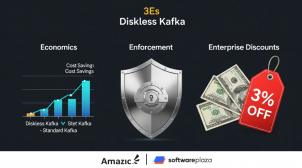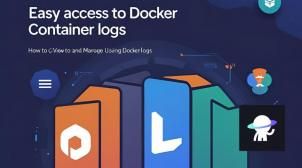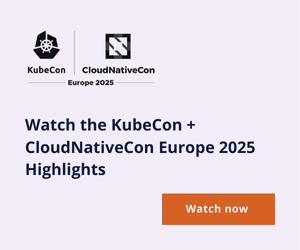-
The Cost of Doing Nothing: How Workflow Chaos Wastes 20+ Dev Hours a Month
Is workflow chaos secretly costing your dev team 20+ hours a month? Discover how inconsistent PRs, endless merge conflicts, and slow onboarding silently kill velocity, and learn practical fixes to standardize your workflows for peak productivity and happier developers.
-
Is It Time to Migrate? A Practical Look at Kubernetes Ingress vs. Gateway API
Still battling Kubernetes Ingress complexities? Discover why it's time to migrate! This guide unpacks the limitations of traditional Ingress and reveals how the Kubernetes Gateway API, implemented by Calico Ingress Gateway with Envoy proxy, offers a standardized, role-aware, and feature-rich solution for secure, streamlined traffic management.
-
The 3 Es of Diskless Kafka BYOC
Explore three ways to buy Kafka in the cloud—Multi-Tenant SaaS, Single-Tenant SaaS, and Bring Your Own Cloud (BYOC)—and discover why Diskless BYOC offers significant economic, enforcement, and enterprise discount advantages for organizations operating Kafka at scale, challenging traditional fully-managed solutions.
-
Diskless Kafka is the Tide, and it’s Rising
Discover KIP-1150 Diskless Topics now live in Aiven Kafka BYOC, enabling Apache Kafka on AWS, Google Cloud, and Azure to write directly to object storage. Learn how this innovation slashes costs by up to 80%, eliminates operational toil, and maintains 100% Apache Kafka compatibility, ensuring zero vendor lock-in and a single logical cluster for all streaming workloads.
-
Docker Container Logs: How to View & Manage
Easy access to Docker container logs is essential for effective development and debugging. This guide explores how to view and manage Docker logs using the docker logs command, Docker Compose, and Docker Desktop. It also covers where logs are stored, how to clear them, and best practices for centralized logging, log rotation, and structured output. Whether you're just starting with Docker or optimizing a production setup, this article will help you tailor container observability to your needs.
-
What are the benefits of decentralized AI infrastructure
Harness AI without sacrificing control! Discover the critical benefits of decentralized AI infrastructure for enterprises, from ironclad data privacy and sovereignty to enhanced security and compliance, and learn how solutions like Civo's relaxAI are setting new standards for responsible AI deployment.
-
Introducing the Anaconda Community Channel: Expanding Your Open Source Arsenal While Maintaining Enterprise Control
Introducing the Anaconda Community Channel – Unlock access to over 16,000 additional open-source packages with the new Community Channel in the Anaconda AI Platform. Designed for enterprises, it offers seamless compatibility with Anaconda’s trusted distribution, all while maintaining governance, security, and compliance. Empower developers, reduce admin overhead, and accelerate innovation—without compromising control. Now available for Business tier customers.
-
The Shadow AI Crisis: Why Enterprise Governance Can’t Wait Any Longer
The Shadow AI Crisis: Why Enterprise Governance Can’t Wait – With over 70% of AI use happening outside IT’s control, shadow AI is creating massive security, compliance, and visibility risks. As unofficial tools proliferate, the need for enterprise-ready governance is urgent. Learn how forward-thinking organizations are turning this underground trend into a competitive advantage with smarter platforms, embedded security, and real-time oversight.
-
Secure and Scalable Kubernetes for Multi-Cluster Management
Managing multi-cluster Kubernetes environments across clouds and data centers introduces complexity, security gaps, and observability challenges. This article explores how Calico Cluster Mesh provides seamless inter-cluster connectivity, fine-grained security policies, intelligent traffic management, and unified observability—empowering teams to build scalable, secure, and efficient Kubernetes architectures. Learn how companies like Box leverage Calico to enforce zero-trust security and simplify multi-cluster operations.
-
Workload Identity Meets Supply Chain Security: Teleport's Sigstore Integration
Modern software supply chains face increasing complexity and risk, especially from supply chain attacks like SUNBURST. This article explores how Sigstore and Teleport's Machine & Workload Identity can fortify your CI/CD pipeline. Learn how Sigstore enables keyless, verifiable artifact signing, and how Teleport integrates these signatures into workload attestation using SPIFFE-based SVIDs. Discover how to enforce policies that block compromised containers from accessing sensitive resources, and how cryptographic identity can replace static secrets for secure service-to-service communication. A must-read for DevSecOps teams aiming to embed security into the development lifecycle.
-
Beyond Traditional AppSec: Navigating the New Frontier of AI Security with Mend AI
Bar-El Tayouri of Mend AI shares why securing AI-driven apps demands new strategie and how to build an effective, future-ready AppSec program.
-
CloudBolt x StormForge: Why Automated FinOps Beats Human Effort
CloudBolt CTO Kyle Campos discusses ending FinOps dashboard overload with action-driven orchestration and how StormForge enhances Kubernetes optimization through real-time automation and smarter remediation.
Filter & Sort



















